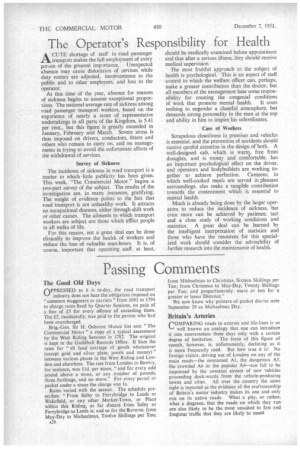The Operator's Responsibility for Health A CUTE shortage of staff in
Page 28

If you've noticed an error in this article please click here to report it so we can fix it.
road passenger transport makes the full employment of every person of the greatest importance. Unexpected absence may cause dislocation of services while duty rosters are adjusted, inconvenience to the public and to other employees, and loss to the operator.
At this time of the year, absence for reasons of sickness begins to assume exceptional proportions. The national average rate of sickness among road passenger -transport workers, based on the experience of nearly a score of representative undertakings in all parts of the Kingdom, is 5.41 per cent., but this figure is greatly exceeded in January, February and March. Severe stress is thus imposed on drivers, conductors, fitters and others who remain to carry on. and on managements in trying to avoid the unfortunate effects of the withdrawal of services.
Survey of Sickness The incidence of sickness in road transport is a matter to which -little publicity has been given. This week, "The Commercial Motor" begins a two-part survey of the subject. The results of the investigation are, in many instances, gratifying. The weight of evidence points to the fact that road transport is not unhealthy work. It attracts no occupational diseases, either through shift work or other causes. The ailments to which transport workers are subject are those which afflict people in all walks of life.
For this reason, not a great deal can be done clinically to improve the health of workers and reduce the loss of valuable man-hours. It is, of course, important that operating staff, at least, should be medically examined before appointment and that after a serious illness, they should receive medical supervision.
The most fruitful approach to the subject of health is psychological. This is an aspect of staff control to which the welfare officer can, perhaps, make a greater contribution than the doctor, but all members of the management bear some responsibility for creating the congenial conditions of work that promote mental health. It costs nothing to engender a cheerful atmosphere, but demands strong personality in the man at the top and ability in him to inspire his subordinates.
Care of Workers Scrupulous cleanliness in premises and vehicles is essential, and the prevention of accidents should receive careful attention in the design of 'both. A well-designed cab, which is warm, free from draughts, and is roomy and comfortable, has an important psychological effect on the driver, and operators and bodybuildets are working together to achieve perfection. Canteens, in which well-cooked meals are served in pleasant surroundings, also make a. tangible contribution towards the contentment which is essential to mental health.
Much is already being done by the larger operators to reduce the incidence of sickness, but even more can be achieved by patience, tact and a close study of working conditions and statistics. A great deal can be learned by the intelligent interpretation of statistics and those who have the resources for this specialized work should consider the advisability of further research into the maintenance of health.
































































































